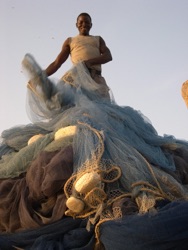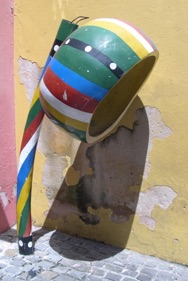INTRODUCTION

INTRODUCTION


Introduction


Total theatre
Music, dance and (puppet) theatre are important forms of communication, and
means of cultural identification. All over the world men mark out their calendars by means of festivals,
which are a way of ordering time; the year's progress is marked by a succession of sacred and profane
festivals, and important events that mark the stages of the life cycle such as baptism and marriage are
festive occasions as well. During these events music, song and dance play an important role, because
they create a special atmosphere. Much better than the spoken word, they convey and reinforce emotions.
Music accompanies song, which expresses feelings or tells a story, and is made visible through dance.
But most of all, dance is a means to enjoy oneself, the embodiment of enthusiasm. Festivals may be seen
as a form of 'total theatre', during which a number of expressive forms such as spoken language, music
and song, (masked) dance, and costumes may be combined. The public plays an important role, as onlookers
and participants in the processions and other events. An important function of ritual is the bringing
together of people; another function is the transmission of cultural knowledge.
I am an anthropologist specialised in musical cultures of the non-western
world and audio visual anthropology.
I was born on July 22, 1941 in Haarlem, The Netherlands. After finishing High
School, I lived three years in France, six years in the USA, and three years in Latin America (Mexico,
Chile, Peru). From 1972-1979 I studied Cultural Anthropology at the State University of Leiden, The
Netherlands.
In 1980-1981 I did fieldwork in Peru, which resulted in a book and a CD.
Since then, I have travelled to Brasil, various African countries (Mali,
Burkina Faso, Benin, Togo, Guinea, Burundi, Kenya, Cameroon, Namibia), and various Asian countries (Sri
Lanka, Burma, Cambodia, India). You will see the results of my fieldwork in Peru, Mali, Togo, Burma,
India and Brasil on this site.
From 1988 to 2003 I was curator of Ethnomusicology at the Tropenmuseum /
Royal Tropical Institute, Amsterdam. Here I acquired experience in museology, as well as knowledge of
the organology and classification of musical instruments.
My main museological activities were:
•The
renewal of the semi-permanent exhibition on Music, Dance and Theatre (1988-1990), where musical
instruments, masks, puppets, and case-studies show music and dance in their social context;
•A
major exhibition on puppetry in Africa and Asia: "Distant Friends of Jan Klaassen. Puppets in
Africa and Asia" (1996), where puppets were placed in their social context by means of decors,
musical instruments, sound- and video-fragments. Author of the accompanying publication;
•Participation
in an exhibition on audible and visible rhythm: "Rhythm, a dance in time" (2000); editor
of the accompanying publications, in Dutch and in English.
In 2005 I started my own label, Samaké Records, to produce CD's and DVD's of
material recorded by me:
•Audio
CD with traditional Bamana songs, Kirango
(Samaké Records 01, 2005)
•DVD
on circumcision ceremonies and masquerade of the Bozo/Somono,
Kirango
(Samaké Records 02, 2006)
•DVD
on children's masquerades of the Bamana, Kirango
(Samaké Records 03, 2006)
•DVD
on traditional Bozo boat builders, Kirango
(Samaké Records 04, 2007)
•Audio
CD with traditional Bozo songs, Kirango
(Samaké Records 05, 2008)
•DVD
on Bamana masquerade, Kirango
(Samaké Records 06, 2008)
•Audio
CD with traditional Bozo/Somono songs, Kirango
(Samaké Records 07, 2009)
•DVD
on Ndomo, a textile workshop, Ségou
(Samaké Records 08, 2010)
•DVD
on the Bozo fishermen living along the Niger river, Kirango
(Samaké Records 09, 2011)
I hope that this homepage will enable people all over the world who are
interested in non-Western performing arts to exchange ideas and further knowledge on this subject.
e-mail: edomusic@mac.com
Credits:
Films, photographs, sound recordings and texts by Elisabeth den Otter (All rights reserved)
Editing and production: Ludwig Pesch
➤Home


